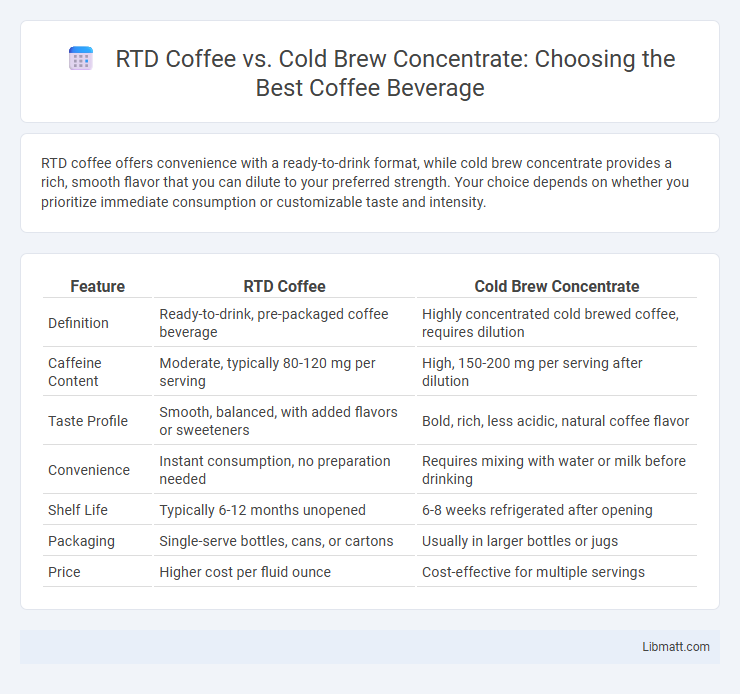RTD coffee offers convenience with a ready-to-drink format, while cold brew concentrate provides a rich, smooth flavor that you can dilute to your preferred strength. Your choice depends on whether you prioritize immediate consumption or customizable taste and intensity.
Table of Comparison
| Feature | RTD Coffee | Cold Brew Concentrate |
|---|---|---|
| Definition | Ready-to-drink, pre-packaged coffee beverage | Highly concentrated cold brewed coffee, requires dilution |
| Caffeine Content | Moderate, typically 80-120 mg per serving | High, 150-200 mg per serving after dilution |
| Taste Profile | Smooth, balanced, with added flavors or sweeteners | Bold, rich, less acidic, natural coffee flavor |
| Convenience | Instant consumption, no preparation needed | Requires mixing with water or milk before drinking |
| Shelf Life | Typically 6-12 months unopened | 6-8 weeks refrigerated after opening |
| Packaging | Single-serve bottles, cans, or cartons | Usually in larger bottles or jugs |
| Price | Higher cost per fluid ounce | Cost-effective for multiple servings |
Understanding RTD Coffee and Cold Brew Concentrate
RTD coffee refers to ready-to-drink beverages that are pre-brewed, sweetened, and packaged for immediate consumption, offering convenience and consistent flavor. Cold brew concentrate is a highly concentrated form of coffee extracted through a slow steeping process in cold water, requiring dilution before drinking and providing a smoother, less acidic taste. Your choice depends on whether you seek the instant accessibility of RTD coffee or the customizable strength and flavor profile of cold brew concentrate.
Key Differences in Brewing Methods
RTD coffee is pre-brewed and packaged for immediate consumption, using various brewing methods such as drip, espresso, or flash brewing, ensuring convenience and consistent flavor. Cold brew concentrate involves steeping coarsely ground coffee in cold water for 12 to 24 hours, resulting in a smooth, less acidic, and highly caffeinated extract that requires dilution before drinking. The primary distinction lies in RTD coffee's ready-to-drink format versus cold brew concentrate's concentrated form that demands preparation prior to consumption.
Flavor Profiles: RTD Coffee vs Cold Brew Concentrate
RTD coffee typically offers a balanced and consistent flavor profile with bright acidity and subtle bitterness, ideal for on-the-go consumption. Cold brew concentrate provides a smoother, richer, and less acidic taste due to the longer steeping process, often featuring chocolatey and caramel notes. The concentrated form allows customization by diluting with water or milk, enhancing flavor versatility compared to pre-mixed RTD coffee.
Caffeine Content Comparison
RTD coffee typically contains 80-150 mg of caffeine per serving, while cold brew concentrate can range from 150-300 mg depending on dilution. Cold brew concentrate's higher caffeine density comes from its slow steeping process, allowing for more caffeine extraction from the coffee grounds. When choosing your caffeine source, consider that cold brew concentrate offers a stronger caffeine punch per ounce compared to most ready-to-drink coffees.
Convenience and Portability
RTD coffee offers exceptional convenience with its pre-packaged, single-serve bottles that are ready to drink anytime, making it ideal for on-the-go consumption without any preparation. Cold brew concentrate requires dilution before drinking, which can limit portability and ease of use in situations where water or mixing tools are unavailable. Both options provide portable caffeine solutions, but RTD coffee excels in seamless convenience for busy lifestyles.
Shelf Life and Storage Considerations
RTD coffee typically features preservatives and airtight packaging that extend its shelf life to several months when unopened and stored in a cool, dark place. Cold brew concentrate, with its higher coffee extract concentration, often requires refrigeration and has a shorter shelf life of around one to two weeks once opened to prevent spoilage. Understanding these storage differences helps you maintain optimal freshness and flavor for your preferred coffee option.
Customization and Versatility
RTD coffee offers convenience with limited customization, typically pre-sweetened and flavored, while cold brew concentrate provides versatility by allowing you to adjust strength, sweetness, and milk or water ratios to suit your taste. Cold brew concentrate can be used in various recipes beyond just drinking, such as in cocktails or desserts, enhancing its multifunctional appeal. Your ability to personalize cold brew concentrate makes it ideal for those seeking a tailored coffee experience.
Price Point and Value Analysis
RTD coffee typically offers convenience at a moderate price point, making it accessible for quick consumption but often at a higher cost per serving compared to homemade options. Cold brew concentrate, while initially more expensive due to larger packaging, provides greater value by allowing you to dilute servings and control strength, effectively lowering the cost per cup over time. Evaluating your consumption habits can help determine whether the upfront investment in cold brew concentrate yields better long-term savings compared to purchasing RTD coffee individually.
Sustainability and Packaging
RTD coffee and cold brew concentrate differ significantly in sustainability and packaging, with cold brew concentrate often favored for its reduced waste due to bulk packaging and refill options. RTD coffee typically comes in single-use containers, increasing plastic and aluminum consumption, whereas cold brew concentrate uses larger, recyclable bottles that minimize environmental impact. Choosing cold brew concentrate can support your efforts to reduce packaging waste and promote sustainable coffee consumption.
Which One is Right for You?
RTD coffee offers convenience and a consistent flavor profile, perfect for those who need a quick caffeine boost without any preparation. Cold brew concentrate provides a richer, smoother taste with higher caffeine content, allowing you to customize strength and dilution according to your preference. Your choice depends on whether you prioritize ease of use or a tailored, bold coffee experience.
RTD coffee vs cold brew concentrate Infographic

 libmatt.com
libmatt.com